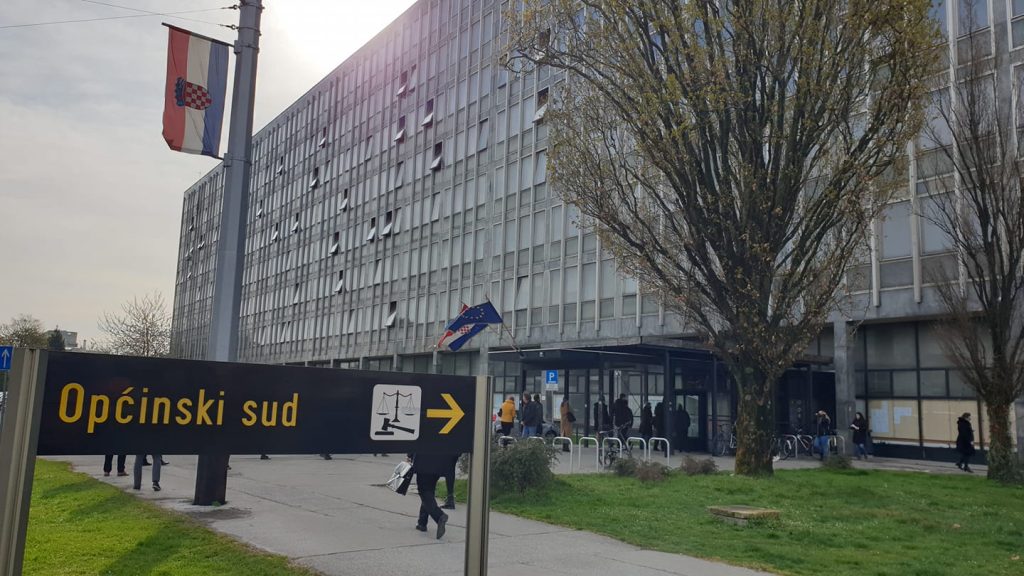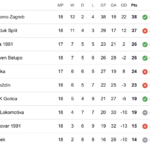I often wondered how I would feel if I got sued and had to go to court.
Earlier this month, I found out, as I finally had my first day in court after the Croatian National Tourist Board sued me not once, but twice. You can read their complaint and my lawyer Vanja Juric’s replies here:
/ / / Croatian National Tourist Board Sues TCN: Lawsuit 1 (50,000 Kuna)
/ / / Croatian National Tourist Board Sues TCN: Lawsuit 2 (50,000 Kuna)
It was certainly reassuing to see Vanja’s cheery and smiling face as we went to the room allocated for the first hearing.
“It will not take long, and then we can go for a pint,” she said warmly.
And indeed it didn’t.
I was all over very quickly in fact.
Vanja spoke first and very eloquently. She is such a gentle soul, but I would not want to be on the opposite side of the courtroom. She argued that the case was clearly ridiculous and should be dismissed.
The judge then responded that the CNTB lawyer had filed an additional motion the day before, which my lawyer was not given prior to the hearing. Apparently, it was done so late because the lawyer had been in hospital all week. The law firm apparently has 6 partners (at least according to the lawsuit documentation) and allegedly 50 lawyers in the firm. But I guess they were all too busy to cover for their sick colleague.
By law apparently, this has to be considered and so the entire hearing has been adjourned until July.
All over in 3 minutes.
You can read the last-minute motion in translation below, as well as Vanja’s reply. I waited until today to publish this latest installment, as Vanja sent the reply today, and I wanted to include in the update.
Meanwhile, we have the first hearing for the other lawsuit scheduled for Monday May 3, at 09:40.
Vanja was contacted yesterday by the CNTB legal team asking for a postponement (the fact that the elections are on May 16 is purely coincidental, I believe). Apparently the lawyer had another case to go to and could not attend. The other 49 colleagues must have also been busy, as nobody could apparently deputies.
We saw no reason for delay but were not given the opportunity to decline, for the judge ruled that May 31 is the new date of the first hearing.
So there we are. None the wiser (actually all the wiser, am learning a ton of stuff, and it really is fascinating to watch The Beautiful Croatia in action). More soon I guess, if only to report another 3-month delaying tactic.
The plaintiff’s preparatory submission
I The plaintiff has received a response to the defendant’s lawsuit and in relation to the same they state the following and propose [an insight into] further evidence. The plaintiff disputes all the allegations from the defendant made in the response to their lawsuit and points out that the objections made by the defendant are unfounded in their entirety.
II The plaintiff is actively legitimised in this legal matter for the following reasons:
The defendant erroneously states that the disputed publication does not refer to the plaintiff and that the slogan “Croatia full of life” is not a trademark of the plaintiff.
Contrary to the defendant’s allegations, the slogan ”Croatia full of life” represents the official logo of the plaintiff and is a trademark in the eyes of the State Intellectual Property Office, where the plaintiff is entered in the trademark register as the holder of the slogan “full of life” (number Z20150201).
Consequently, it is clear that the defendant’s complaint about the lack of active legitimacy of the plaintiff is unfounded.
Evidence: A print-out from the trademark database for trademark number Z20150201, (attached)
A copy of the decision of the State Intellectual Property Office, (attached)
Aside from the fact that the above is a trademark registration, the plaintiff has been using the trademark and several variants of the same slogan for many years and translations of that slogan on their website, www.croatia.hr, for all promotional materials and at congresses, and the general public in Croatia clearly connects the slogan and its visual elements (especially the font of the lettering) precisely with the plaintiff, and not with Croatia in general or with Croatian tourism in general. It is an umbrella communication concept that was presented back in 2015 by the President of the Croatian National Tourist Board.
Evidence: An insight/view into/of the plaintiff’s website at www.croatia.hr
A print-out of the first page of the plaintiff’s website with a visible logo, (attached)
The examination of witness Davorin Purgaric, of the plaintiff’s staff, on the circumstances of using the slogan and the circumstances of the lawsuit.
The examination of witness Lucija Zupancic, Head of the Prosecutor’s Production Department
At the same time, the word “Croatia” in the defendant’s [Facebook] post corresponds exactly to the sign used by the plaintiff as a legal entity, which consists of the inscription Croatia and two squares and as such is used in translations in several languages by the plaintiff.
By using the official signs of the plaintiff, turning it into offensive content and changing the plaintiff’s slogan, the defendant violated the plaintiff’s rights, both the plaintiff’s rights as a trademark holder and the plaintiff’s personal rights as a legal entity.
Pursuant to the provisions of Article 128 of the Trademark Act, the trademark holder may claim damages under the general rules on damages against a person who has caused damage to the trademark holder by the unauthorised taking of any of the actions referred to in Article 11 of the same Act.
III With regard to the defendant’s allegation that the plaintiff didn’t request the publication of a correction or the removal of the publication, the plaintiff considers it necessary to point out that these are not procedural preconditions for filing a lawsuit for damages either in terms of the Trademark Act or the Civil Obligations Act. Therefore, the plaintiff was not obliged to do the same before initiating this proceeding.
In this specific case, the non-pecuniary damage caused cannot be remedied by removing the defendant’s publication or by receiving an apology from the defendant, because the publication itself caused reputational damage to the plaintiff’s reputation.
As pointed out in the judgment of the County Court in Varazdin, posl.br. Gz-491/19 of 19 May 2020 (…) ”in modern society, information spreads easily and quickly and it is common knowledge that subsequent denials or findings of untruthfulness of [previously] publicly disclosed information don’t reach all those who have previously been informed with what is in fact misinformation.” Taking into account the way in which the misinformation was published, on Facebook, the plaintiff believes that removing the post would have no effect.
At the same time, the allegations of the defendant that the plaintiff showed that they weren’t harmed because they never sought an apology or a withdrawal of the [offending] publication are disputed. The stated/aforementioned allegation made by the defendant, apart from being incorrect, isn’t logical either, because this is merely the right of the injured party, it is not an obligation for them to demand compensation for non-pecuniary damage by asking for the publication of an apology or a correction, and in addition, as stated above, the reputational damage to the plaintiff wouldn’t be repaired with the removal of the post. After the post has already been seen by many Facebook users due to the way the Facebook functions, as users do not seek out old posts again, removing the post would not have the purpose of repairing the damage incurred.
IV Furthermore, the plaintiff points out that the plaintiff’s claim is not aimed at forcing the defendant to stop talking about tourism problems, as the defendant is incorrectly trying to portray. The defendant is legitimised in this lawsuit because he is [acting in a] harmful manner – by distorting the official slogan of the plaintiff and entering the word “uhljebs” instead of “life”, meaning that he tried to state that the plaintiff’s employees were unqualified or incapable of doing their jobs and thus created a negative image of the plaintiff and their employees – causing harm to the plaintiff.
Evidence:
– The hearing of the plaintiff’s legal representative, director Kristjan Stanicic
Namely, the term “uhljeb” is always used in society in a negative and derogatory context and is associated with a person who is unskilled and incapable of doing the job for which he is paid, and is employed thanks to political or family ties, without any real merit. Due to the use of the word in question within the plaintiff’s slogan, an extremely negative image of the plaintiff was created, as a result of which the elements provided by law for the award of non-pecuniary damage in a particular case were met.
In addition, the defendant did not substantiate his position that these [HTZ/employees] were “uhljebs”, it was a statement made without any evidence, so it’s clear that this is an obvious insult, which damaged the reputation of the plaintiff. It is indisputable that the issue of good reputation is extremely important for legal entities, so if such an incident attracts questions/attention, it also constitutes a violation of rights.
The plaintiff additionally points out that the defendant’s Facebook profile is followed by 1283 people, while his profile is public, and the defendant’s posts can be viewed by people who do not follow the defendant.
Evidence:
A print-out of the defendant’s Facebook profile (the introductory part – with the number of persons following the defendant’s profile – attached)
The plaintiff further proposes that the title court order the defendant to submit information on the number of reviews of the publication in question on the defendant’s Facebook profile, and in the alternative, they propose that an IT expert conduct an expert examination in the same circumstance.
Evidence:
The obtaining of the data from the defendant on the number of reviews of the subject publication.
V As regards the defendant’s allegation in point 5.2. and 6.1 [of the] response to the lawsuit, the plaintiff considers it necessary to point out that they do not question the right to freedom of expression, which is one of the fundamental principles. However, it should not be forgotten that freedom of expression is not an absolute right and that the Convention for the Protection of Human Rights and Fundamental Freedoms and the Constitution do not guarantee unrestricted freedom of expression, as the defendant seeks to portray, this right is limited by other rights, such as the right to the reputation and honour of others. In other words, freedom of expression must not be to the detriment of other human rights.
The same view has been expressed through case law:
“The right to freedom of expression must, however, be interpreted in accordance with the highest values of the constitutional order, namely freedom, equality, national and gender equality, peace, social justice, respect for human rights, the inviolability of property, nature and the environment, the rule of law and the democratic multi-party system (Article 3 of the Constitution).
Likewise, the Convention in the further provision of Art. 10 paragraph. 2 stipulates that, as the exercise of these freedoms (as referred to in paragraph 1 of the same article) includes duties and responsibilities, it may be subject to formalities, conditions, restrictions or penalties prescribed by law, which are necessary in a democratic society for the interests of the state, security, territorial integrity or public order, to prevent disorder or crime, to protect health or morals, to protect the reputation or rights of others, to prevent the disclosure of confidential information or to preserve the authority and impartiality of the judiciary.
The plaintiff has to show a greater degree of tolerance for public criticism than private individuals who are not exposed to the public are obliged to do. Ensuring the right to freedom of expression is of great importance for a democratic society, but that does not mean that it is an absolute right, and it is also subject to restrictions.”
Source of the above: Judgment of the County Court in Varazdin, posl.br. Gz-491/19
In addition, in assessing the balance between the right to freedom of expression on the one hand and the right to respect for the private life of others on the other hand, the European Court of Human Rights in Axel Springer AG v. Germany stated the circumstances according to which in principle it assesses a fair balance conflicting rights, and these are the following criteria:
a) The contribution to the debate in the public interest;
b) The extent to which the person concerned is known to the public and the content of the statements made;
c) The previous conduct of the person to whom the statement relates;
d) The methods of collecting information and their verifiability;
e) The content, its form and the consequences of published information;
f) The seriousness of the sanction imposed and the discouraging effect it has
If all of the circumstances and the elements of the publication in question are considered, it is evident that the defendant in the disputed publication did not state any well-founded position or value judgment or otherwise participate in the public interest debate, but from the general “tone” of the defendant’s publication, without any argument or evidence, was only intended to ridicule/insult the plaintiff as a legal entity and its employees (who are referred to as uhljebs). Moreover, the defendant did not even provide any evidence that there would be a current public debate at the time of the publication that would have any links to that publication.
In that same sense, the plaintiff also points to the decision of the Constitutional Court of the Republic of Croatia in the case posl.br. U-III / 4336/2017 of June 26, 2019:
“The Constitutional Court is aware of the debate on these issues in public and understands the desire of many individuals to participate in it, however – given the context in which the disputed statement was given, the circumstances that preceded it, as well as the content of the disputed statement – it can be concluded that in the present case – it is not a debate of public interest.
Namely, the issuance of the disputed statement was preceded by the circumstance that the complainant was interrupted by an HRT employee, whose director at the time was the plaintiff, in giving a statement that was to be broadcast on HRT’s fourth programme as part of the election campaign, because the content of his promotional statement was inappropriate and offensive for HRT, as a public television station, to broadcast on one of its programmes. The complainant then commented negatively on the event in front of HRT’s main building, complaining about the interruption of his statement as part of the election campaign, stating that it was censorship and referring to HRT employees as “cowards, wretches, bandits”. He also made a claim about the plaintiff, the then director of HRT, as a former and further associate of KOS [the former counterintelligence service of the former state], which was filmed by his colleague Natko Kovacevic.
23. In view of the above, having in mind the context in which the disputed statement about the plaintiff being an associate of KOS was given, the Constitutional Court finds no reasons for the existence of a public hearing on the alleged cooperation of the plaintiff with the notorious counterintelligence service of the former state. Moreover, it follows from the context in which the impugned statement was made that the complainant’s sole intention was to insult the plaintiff.”
29. The Constitutional Court notes that the impugned statement, in the circumstances in which it was given, was intended to present the plaintiff – at the time during which he was acting director of HRT – as someone who was a member of the notorious counterintelligence service of the former state, which is in itself dishonorable, all with the aim of harming his reputation and honour. Accordingly, the Constitutional Court finds that the applicant did not act in good faith when giving the disputed statement about the plaintiff.”
Finally, it should be borne in mind that the plaintiff invested both time and money in the drafting of the slogan in question (as with any other slogan), and the use of the slogan in an inappropriate manner by the defendant diminishes the property value of the trademark holder.
VI In the light of all the above, the plaintiff proposes that the title court determine that the defendant is liable and that it the violation is of a strength that justifies the determination of fair monetary compensation and for the defendant to accept the lawsuit and the claim in full, and oblige the defendant to compensate the plaintiff for the the cost of the proceedings within a period of fifteen days.
Reply from Vanja Juric, lawyer representing Paul Bradbury
The defendant’s submission
The defendant remains in full agreement with his [previous] response to the lawsuit and all of the previous allegations and objections, and, in the continuation, he comments on the allegations of the preparatory submission of the plaintiff, dated April 7, 2021.
1. The defendant disputes that the slogan “Croatia full of life” is a sign/mark by which the plaintiff – as a public authority – presents itself to the public. This can be seen by looking at the very title page of the plaintiff’s website, which shows that the sign/mark of the Croatian National Tourist Board is a stylised inscription which reads: “Croatian National Tourist Board/Hrvatska turisticka zajednica”.
EVIDENCE:
– An insight into the print-out of the title page of the Croatian National Tourist Board, dated April 28, 2021.
1.1. As previously stated, the defendant does not dispute that the “Full of life” slogan is a slogan that is protected under the Trademark Act, however, it is not the plaintiff’s label, but the promotional slogan of Croatia as a tourist destination. After all, the plaintiff itself confirmed this in the lawsuit, stating that the slogan “presents the Republic of Croatia as a tourist destination on global tourist markets.”
1.2. It is also incorrect that the public associates this slogan with the plaintiff, since it is indisputably associated with the promotion of Croatia in the world. However, even if the public really believes that this slogan represents the plaintiff (and the plaintiff’s employees) directly, such a possible public attitude would still not be sufficient to prove the plaintiff’s claim that the disputed publication of the defendant refers to the Croatian National Tourist Board. Likewise, the website www.croatia.hr, as cited by the plaintiff, is not a page about the plaintiff nor does it exist for the purpose of promoting the plaintiff (as a public authority), but – as its name suggests – it is a page about Croatia as a tourist destination. For this very reason, the slogan “Full of life” is on that page, as the tourist slogan of Croatia.
1.3. Not one of the allegations against the defendant are disputable in this procedure – he does not address the plaintiff, he does not state or mention the plainiff, nor does he mention the plaintiff’s employees. The plaintiffs’ interpretations in this regard are completely irrelevant, as the impugned publication has been submitted to this file and it is quite clear what it reads and what it involves. Since the plaintiff, therefore, is not actively entitled to conduct this procedure, since the said (disputed) publication does not refer to or mention the plantiff, it is proposed – without further discussion – to reject the claim as unfounded.
2. Although the defendant considers that it is completely out of place to emphasise it in this case, we would still like to emphasise that this dispute is not because of the violation of the plaintiff’s rights as a trademark holder, but for the alleged violation of the plaintiff’s personality, by publishing satirical content on the defendant’s Facebook page. To that extent, the plaintiff’s reference to the provisions of the Trademark Act and the payment of damages, based on the Trademark Act, is completely pointless. If the plaintiff, however, does seek damages in this case, it is proposed that the court summon the plaintiff to state the legal basis of such a claim, so that the defendant is informed in time of the facts and circumstances which he must prove in this case.
2.1. Alternatively, as a precaution, the defendant points out that no provision of the Trademark Act has been violated. Article 11 of the Trademark Act, to which the plaintiff refers in their statement, refers to the possible unauthorised use of another’s trademark “in commercial trade, in connection with products or services”. It is indisputable that the defendant did not use anyone’s trademark, and especially not the plaintiff’s trademark – in trade (commercial or otherwise}, or in connection with products or services, but as a satirical illustration/comment, posted on a private Facebook page.
3. It is not disputed that the filing of a request for correction/apology or removal of the publication, as well as the request for withdrawal of the statement are not procedural preconditions for filing a lawsuit in this case. However, given that the plaintiff did not take a single action to stop the further occurrence of the alleged damage or to otherwise obtain satisfaction – it is clear that no damage was even caused to the plaintiff. The Law on Civil Obligations prescribes the primary ways to repair/put a stop to damage. The plaintiff undoubtedly didn’t utilise any of those possibilities.
3.1. The decision of the Varazdin County Court cited by the plaintiff in his statement is contrary to the decision of the Supreme Court of the Republic of Croatia, case no. Rev-1331/16, dated January 23, 2018, in which the Supreme Court explicitly recognised the removal of harmful publications as one of the important ways to stop the occurrence of further damage: “… there are no legal obstacles to making such a request. Moreover, the Supreme Court of the Republic of Croatia found that, in cases of this kind, “there is no effective legal protection without the possibility of removing the disputed content from the Internet because otherwise proceedings for violation of [personality] rights continue, and even increase the damage caused.”
4. The defendant will not comment in more detail on the allegations of the plaintiff from item IV, since he insists that the disputed publication does not refer to the plaintiff, nor does it mention the plaintiff.
4.1. However, as a precaution, if the plaintiff continues to insist on such allegations [being true], the defendant will propose evidence of the fact that there is a sufficient factual basis to allow the plaintiff to be called/referred to as an “uhljeb” (although this is not the case here).
5. In relation to the plaintiff’s allegations about the scope of the right to freedom of expression, among which they state that “freedom of expression must not be to the detriment of other human rights”, the defendant points out that freedom of expression is one of the fundamental human rights. It is indisputable that this is not a right that is absolute and that it is as such subject to certain restrictions, however, it is completely incorrect that there are no circumstances in which “this may be to the detriment of other human rights”.
Namely, if there is a sufficient factual basis for the publication of certain information and if the information is published in the public interest and good faith – it is allowed to damage the reputation of another person. These are the basic standards of freedom of expression that have been established in a number of decisions of the Constitutional Court of the Republic of Croatia, as well as decisions of the European Court of Human Rights.
5.1. The Decision of the County Court submitted by the plaintiff, case no. Gz-491/19, just confirms these allegations, as it explicitly establishes the general views of the European Court of Human Rights, according to which entities ”must show a greater degree of tolerance towards public criticism than private individuals are obliged to do.” In this context, both the plaintiff’s leadership and the plaintiff themselves, as a public authority, absolutely open up all the criteria for the application of this principle.
6. In addition, contrary to the plaintiffs’ allegations, a public debate on the state of tourism has been taking place throughout the disputed period, ever since the beginning of the coronavirus pandemic. It is therefore undisputed that the defendant’s announcement was part of a broad public debate on Croatia’s ability, as a tourist destination, to cope with the challenges caused by the pandemic.
6.1. During this period, all Croatian media reported on the state of tourism and the activities and campaigns of the competent authorities, all with the aim of initiating a public debate on these issues, and finding solutions to the problems encountered by Croatian tourism. In the same period, a number of inaccurate and chaotic pieces of information about the conditions of arrival in Croatia, the conditions for crossing borders and other important circumstances that tourists should have known were spread in Croatia, as well as in the countries from which tourists come. This was, as such, commented on by numerous tourism and communication experts.
EVIDENCE:
An article entitled: “The Minister of Tourism revealed three scenarios for this year’s season: It is possible that overnight stays will drop by 90 percent”, Glas Istre, April 2, 2020.
– An article entitled: “Disaster on the horizon: A steep decline in tourist overnight stays – 94.8 percent fewer tourists came in May [this year] than in [May] last year”, www.net.hr, June 10, 2020
– An article enttirled “Croatian tourism is on its knees: The situation is uncertain, and the announcements aren’t promising: We’re opening the hotel, but we have no reservations”, www.net.hr, from June 1, 2020
– An article “Let’s strip naked to the end/We’re being stripped naked to the end! A country of missed opportunities with 314 tourist boards “, from April 10, 2020
– The hearing of witness Kresimir Macan
6.2. Tourism is one of the economic branches from which a significant number of Croatian citizens live. Additionally, Croatia’s revenues from tourism reach as much as 25 percent of GDP, so there can be no doubt that the success of tourism and tourism as such is a matter of significant public interest. In addition, the plaintiff is a public authority, whose activities are financed with taxpayers’ money, from the budget of the Republic of Croatia, and which is responsible for the affairs and functioning of the tourism industry in Croatia. Therefore, any member of the public or the media has the right and duty to comment, criticise and problematise their public actions and all circumstances related to the performance of tasks delegated to them.
7. In conclusion, the decision of the Constitutional Court referred to by the plaintiff in his statement is not applicable to the present proceedings. The case decided by the USRH refers to the proceedings conducted by the director of HRT against a person who stated that he was an “associate of KOS”. In this case, it is, therefore, a matter of making a false and extremely harmful statement, while in this case it is a matter of satirising the tourist slogan of Croatia.
8. It is not entirely clear to the defendant why, in the present proceedings, the plaintiff mentions the “property value of the trademark” at all, since the proceedings, as stated earlier, are not about the trademark, the unauthorised use of the trademark or compensation for property damage (?). In that sense, the defendant hasn’t violated the plaintiff’s rights in any way. Therefore, the defendant will not comment further on this part of the plaintiff’s submission.
* * * * *
Following the above, it is proposed to the court to reject the plaintiff’s claim in its entirety, and to oblige the plaintiff to reimburse the defendant for the litigation costs incurred.








